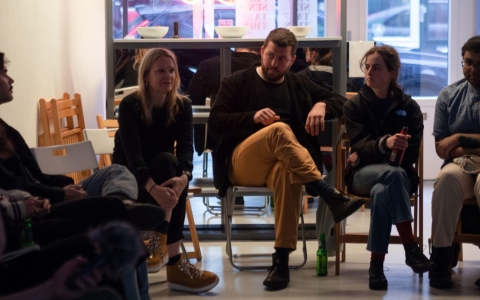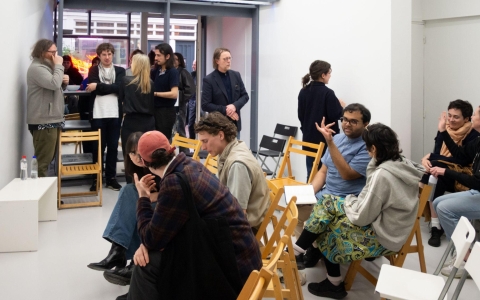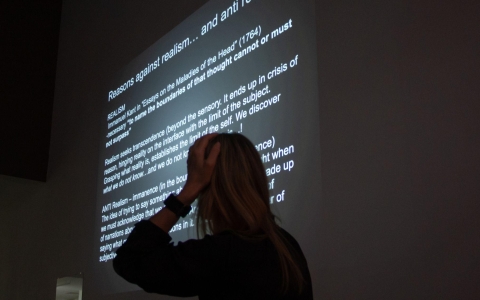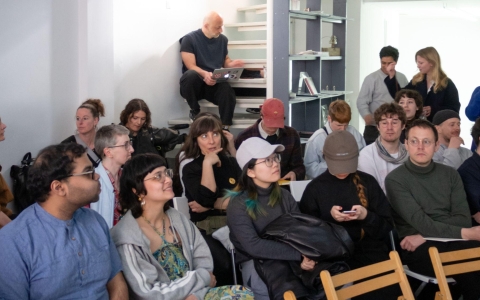Representation. Ends, Means, Desires and Capitalia
A Seminar with Amanda Beech
04.05.2024, 16:00
We invite you to this Desire and Capital post-scriptum, fronted by Amanda Beech, at Rib. During the seminar titled Representation. Ends, Means, Desires and Capitalia, Beech will present her work on the subject of representation (politics) in contemporary art. It will be followed by a response from Maziar Afrassiabi as himself: as embodied representative of Rib. The event is meant to facilitate an encounter so we may interrogate and reevaluate our positions regarding questions of representation in the art, capital and desire triad.
This event is organized by Sonia de Jager, Maziar Afrassiabi and Amanda Beech.
Has the primacy of subjectivity and the rejection of reason disabled art to comprehend and represent our current crisis? In what ways do ideologies of expectation condition art? We are excited to have continued our dialogue with Amanda Beech with the seminar titled Representation. Ends, Means, Desires and Capitalia, in an effort to understand the genealogy of these questions and their possible implications.
During the seminar Amanda Beech presented her work on the subject of representation in contemporary art. She criticizes an “inability to deal with representation; that is, how we might account for art as a field of representation, a space of knowing, that goes beyond traditional metaphysics or the ontology of art as a mirror of what is – art as nature“ (p.2, Art’s Intolerable Knowledge, 2021) in contemporary art. To her, the naturalization of pessimism about epistemology and representation in art is a consequence of anti-realist positions that are concerned with immanence rather than transcendence, rejecting the idea of objective truth and rendering the apprehension of reality as entirely subjective. This art stops wanting to represent the problem or the condition of the human and instead works with the idea of being in the world as a form of unconscious automated action, crisis thereby becoming the stuff of our existence. In opposition to this, Amanda Beech asks whether art can work in a non-subjective form of realism that can say something about the abstract complex that is reality and go beyond the reproduction of the current crisis. Realism is here defined in reference to Kant as the question of articulating that which we cannot imagine, nor have any analytical grasp on. She stresses the potentiality of a rational materialism in art as a proposition for a methodology that can “release reason and subjectivity from its negative typecasting, and […] endow art with much needed and stronger epistemic credentials” (p.7).
To illustrate this form of practice, the presentation ended with a screening of Amanda Beech’s work Covenant Transport Move or Die (2015), a multi-channel video installation that is interested in the fetishization of mobility both by capitalism and artistic critique. In the video five characters who know everything about everything, having mapped out past, present and future through a game-like system “wade through the terrain of global capitalist power from a collective psychology that transcends the political stagnation of technology, industry and the mire of our present imaginary.”
We concluded the seminar with a conversation between Amanda Beech, the audience and Maziar Afrassiabi, reflecting on the presented diagnosis and its proposed consequences for art.
—Text by Louisa von Moreau
Amanda Beech is an artist and writer. In video, painting and other forms, her work apprehends structures that subtend and are coextensive with our lived reality. By exploring the connection and estrangement between the act of saying what is and manifesting what ought to be she invests in the capacity for a new form of realism. This demands the invention of new techniques and forms of reason and comprehensions of contingency which are drawn from philosophical theory, science, literature and real political events. The proposition that art can produce a form of intelligence beyond the principles of capitalism necessarily questions the limits that art has historically set for itself by means of its critiques. She has exhibited widely in various Biennales and has written texts for anthologies and museum catalogs. She has edited numerous books including being the contributing editor of Construction Site for Possible Worlds, 2019, Urbanomic/MIT Press and Cold War, Cold World, Urbanomic, 2015. Her recent work includes an essay on Jean Francois Lyotard’s exhibition Les Immateriaux for Beyond Matter, ZKM, Karlsruhe, and a solo show at Twelve Ten Gallery, Chicago. Recent talks include Map of the Bomb, as part of her role as visiting professor at Aalto University Finland and The Question of Realism, for Vienna University of the Angewandte as part of her current role as Visiting Professor at the Vienna Akademie of Art. Forthcoming work includes a new book on art, aesthetics and philosophy; The Intolerable Image, from MIT.
Schedule
16:00: Introduction Maziar
Afrassiabi
16:15: Seminar Amanda
Beech
17:15: Discussion
18:00: Dinner break (not provided, but there are places around Rib)
18:45-late: Extended discussion with drinks, provided by Rib
Information
Please note this event will be recorded.
We kindly ask you to RSVP, since it will be open on a first-come, first-served basis. In order to reserve a spot please send an email to: communications@ribrib.nl.
Please come prepared for a seminar-like event. The idea is that we work towards ideas collectively, hand-waving and dick-swinging will not be appreciated.
Suggested readings
Amanda Beech, “Art’s Intolerable Knowledge”, in The PostResearch Condition, eds. Henk Slager and Iris van de Tuin. Volume/Event Contributors: Peter Osborne, Hito Steyerl, Vytautas Michelkevičius, Florian Cramer, Terike Haapoja, EARN Working Groups, Rachel Armstrong, Amanda Beech, Denise Ferreira da Silva, Irit Rogoff – Editor Henk Slager, Final Editor Annette W. Balkema.
Amanda Beech, “Heroic Realism: Violence, Conservatism, and the Fate of Culture”, in Urbanomic Docs, 2016.












